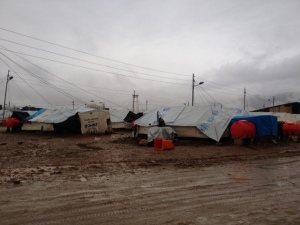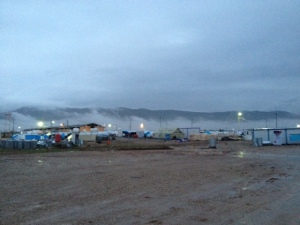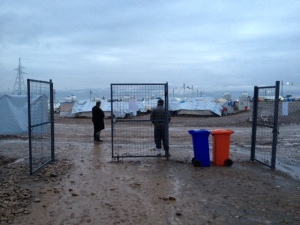Early yesterday afternoon in the clear, bright winter light of the school yard, my grade 1s were suddenly all calling my name. “Miss Devin! Miss Devin!” They pulled me over to the corner of the yard where they have a view of the low mountains surrounding Suli’s gentle valley, and pointed excitedly. The tops of the mountains were dusted with snow, and my students were thrilled.
An article went around the internet in the last day or so – photos of various cities in the Middle East covered in snow. It’s a common aspect of winter here in northern Iraq, but there’s something a little surreal about seeing photos of palm trees sagging and wet with the new snow. It makes for some beautiful scenes.
The photos I was struck by weren’t the ones of the Blue Mosque in Istanbul, or the Western Wall in Jerusalem, but the ones of Syrian rebels in Aleppo, firing from under sagging orange trees, and a man and his child in a refugee camp in Aleppo. Because as pretty as the photos of our major landmarks are, I cannot begin to imagine how uncomfortable heavy, slushy snow becomes when you live in a refugee camp.
I visited one in the pouring rain last weekend, and that was bad enough.
The Arbat refugee camp is about a half hour east of Suli near the Iranian border and houses some 3,000 displaced Syrian Kurds, who were bussed here by the KRG after crossing the border into northern Iraq from Syria. The camp is perhaps one of the more manageable ones, the smallest in the region, and has yet to reach capacity. The 3,000 refugees here are only a fraction of the almost quarter million Syrians who have fled to Kurdistan because of the conflict in their country (the majority are located closer to the Syrian border, near Dohuk).

I was invited to visit the camp on Friday with my friend who volunteers with RISE Foundation on her weekends. RISE in an NGO that implements a number of projects assisting refugees across Kurdistan, and the specific one underway in Arbat is a movie afternoon for the children here. Once a week, with the assistance of a Syrian teacher in the camp, RISE’s Luke sets up a projector, a screen, a soundboard and a laptop, and for an hour or two, the children who live here have a brief escape. This week, almost 200 children ducked into the UNICEF children’s tent to watch a collection of Pixar’s animated shorts. It was almost twice as many as had participated the week before.
This week, on my first visit to the camp, I was able to help out with something in addition to the crowd control the movie viewing requires (kids, refugee or otherwise, are still kids, and are fidgety as hell). As the rain drummed on the roof above us, children made their way into the tent, dropping their dilapidated sandals, rain boots, and canvas shoes at the entrance. Others arrived barefoot or in soaked socks. Luke and Tessa were prepared. Realizing last week how few children wore socks in their shoes and boots, they put out a call to friends and family who donated enough money for us to buy almost 200 pairs of socks (bought in the bazaar earlier), 30 tuques, and 16 scarves.
For the next twenty or thirty minutes as kids poured into the tent, we distributed the socks onto pairs and pairs of cold, wet, dirty little feet. Many of the kids, after being handed their pair, gave us incredulous looks. When they stared at me, I mimed putting them on. We were treated to wide grins when they realized this was something they got to keep and wear immediately. I pulled socks onto the smaller ones while they patiently rested their hands in my hair to help balance while they offered each tiny foot to me. They settled in to watch the movie, with fresh pink, purple, and white socks poking out from the edges of their trousers.
I’ll pause here while some of you are undoubtedly nursing quiet academic criticisms towards the ideas of charitable handouts, or white-Westerners-helping-the-Syrians concerns. I’m going to dismiss them both. The Arbat camp is operated by UNHCR, UNICEF, and other small local NGOs that each contribute different skill sets and operate various projects in the camp, such as RISE’s movie afternoons. The KRG does not have the capacity to provide enough aid to the number of Syrians who live in camps within Kurdistan’s borders. Being able to ensure that most of the children in the camp now own a pair of socks – because someone had the money and capacity to purchase them and the ability to provide them – is one of those small assurances that, if we can do it, we damn well should. This would be impossible in the bigger camps where there are thousands of children, and it is necessary to work through the administrative channels of UNHCR to donate aid and supplies. But in Arbat, with only 3,000 people, and a fraction of them children, it can be done.
Almost immediately, some of the first boys who entered the tent and keenly watched us checking sizes and attempting to make sure kids were getting something that fit caught on to our system. Shortly, we had some self-important young helpers, who shepherded in new arrivals, waved around the various colours, argued, traded, and efficiently pushed through the smaller children lingering in the doorway. The socks disappeared quickly as more and more children appeared, and when we lost track and tried to offer the same one a second pair by accident because they’d left and re-entered, they cheerfully shook us away and showed off the pair they received earlier.
The UNICEF tent is a safe place for the children on the edge of the camp, accompanied by a brightly coloured playground. Inside, a rough carpet decorated with pictures of cars and trucks warms the canvas floor, and artwork by the kids is strung between paper chains on the cloth walls. Despite a small heater in the corner, it’s still cold inside: I wore a shirt, a plaid, a hoodie, and a scarf for the afternoon, and everything felt damp. But for the kids, it’s a place to get away from the tedious-ness of the camp, and the movie afternoon is an opportunity for their parents to have some time to themselves.
For the most part, they sat quietly watching the movie, laughing uproariously at parts – slapstick humour is one of those universal things everyone understands, despite different languages and histories.
And after we’d run out of shorts, and the kids started preparing to head home, an iphone got plugged into the soundboard and suddenly, dance music was blaring through the tent. Immediately, there were kids dancing on plastic stools, kids making a conga line, kids jumping and falling over and stepping over each other and picking each other up and clapping and jumping harder. For a few more minutes, the reality of where we were was quietly put aside, and all of the excess energy from the afternoon was dispelled, the rain forgotten, and the UNICEF tent buzzed with the laughter and movement of the kids of the Arbat refugee camp.
When we left the camp as the light disappeared in the late afternoon, I looked back across the muddy tracks, where the low UNHCR-tarped tents are aligned in straight lines, like every picture of every refugee camp you’ve ever seen. A low fog was moving down off the hills into the camp and the rain was lifting. The small fruit and vegetable stand that is set up at the entrance with the words “potable water” adorned on it was the only structure that offered any colours against the ubiquitous canvas and mud. A few distant people were walking up the gentle slope towards what looked like a small, standing water reservoir near the makeshift school, preparing for another cold night in the camp. We walked down the highway looking for taxi, and they all disappeared behind us.
We drove back to Suli as darkness set in properly. At my house, I scraped mud off my boots and was thankful that my windows were glass, and kept out the rain. I turned on all of my heaters, checked emails in bed, visited the only nice bar in town for wine with friends. I wracked my brain trying to remember the name of the camp, but failed and had to be reminded by friends later. I tried to google map it, but it doesn’t exist, of course, as it’s not a permanent structure. Just 3,000 lives, hanging in nameless limbo, as a war rages at home.
The next morning, as I opened up the curtains of my warm, clean, dry apartment, I was treated to a sight already being passed around the world on the internet: the tops of the hills around me, like the muddy tracks of Arbat’s camp, had changed colour overnight, and were now bright and clear with newly fallen snow.


